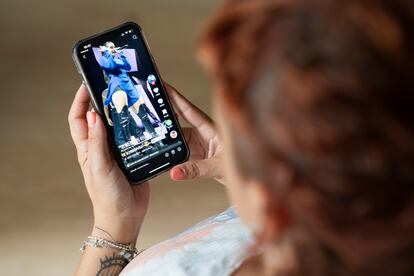Time limits on Instagram and TikTok may actually increase usage
A U.S. study adds to mounting evidence that monitoring alone can’t change behaviors

How much screen time is too much? TikTok set a default limit of 60 minutes for users under 18. Other networks and platforms have similar settings that notify users when the self-imposed time limit is reached. Despite their good intentions, these tools may be counterproductive: instead of reducing screen time, they may even increase it.
A preliminary study by researchers at Duke University and the University of Delaware suggests that setting time limits on social media and video game use may be ineffective. In one of the study’s experiments, participants were allowed to use TikTok as much as they wanted for a few days and then were asked to self-impose a daily time limit. The results showed that, on average, users spent 7% more time on TikTok the day after setting the limit, which most set at 60 minutes.
The researchers compare this contradictory effect to setting a budget for non-essentials, like clothing or leisure. For example, when people budget $100 a month for clothes, they spend all or even a little more. This happens because people intuitively understand that the budget is explicitly reserved for buying clothes, so using it all doesn’t cause feelings of guilt. According to the study, exceeding the budget costs less psychologically. A similar effect happens when Instagram or TikTok users set screen-time limits because they mentally justify using the entire allocated time.
Limit or reduce
The research found that more information about a particular habit is insufficient for modifying behavior, like recording physical activity or calorie intake is ineffective for weight loss. Monitoring screen time alone will not change digital practices.
So is setting time limits useless? “It’s an interesting question,” says Duke University professor Jordan Etkin, one of the study’s authors. Etkin says these tools help, but they’re not enough and stresses that the motivation to set limits is an important factor in measuring effectiveness. “If your goal is simply to avoid excessive activity, time limits should help you achieve that,” she said. However, if you want to reduce the activity, time limits will only be effective if they are set very low, at less than 30 minutes daily for example.
Participants in the experiment who set a TikTok time limit of 20 minutes fared better than participants who set a 90-minute daily limit. “Even if you sometimes choose to exceed your limit, those notifications help discourage you from spending so much time on that activity,” says Etkin. However, the minimum time limit a user can set on TikTok is 40 minutes, so it’s best to use tools or other apps that allow lower limits that are more effective in changing behavior. But there is another problem. When people get used to the notifications and start ignoring them, they lose their effectiveness.
Health psychologist José Tamayo Hernández believes that despite greater collective awareness of the negative effects of too much screen time, this awareness does not always lead to reduced usage. “If people are not sufficiently motivated to change their behavior, the adverse consequences are very easy to ignore,” he says.
Put away the mobile phone
Tamayo suggested other strategies to reduce screen time, such as putting away mobile devices so they are not always within arm’s reach, especially around bedtime and while studying, working and during other activities needing concentration. When abiding by app time limits fails, Tamayo says you must take measures beyond the digital device. “Coordinate mobile phone use with time-limited situations, like travel time, rest periods or waiting for an appointment.”
Another approach is to be conscious of actions, emotions and immediate surroundings. Thinks about what you’re doing at all times: “I’m looking at Instagram for the fifth time today for no particular reason.” Think about what you should be doing (finishing homework) and how you feel (tired or wanting to sleep). “So much behavior on these apps is automatic that we don’t realize how much time we spend on them daily,” says Tamayo.
The main downside of being hooked to your mobile phone is all the other things you could be doing instead. Professor Etkin mentions smartwatch functions that remind you to stand up and take a break. “It’s not always about stopping something, but starting something else. Instead of a notification to stop browsing TikTok, how about one that reminds you it’s time to do something else?”
Sign up for our weekly newsletter to get more English-language news coverage from EL PAÍS USA Edition
Tu suscripción se está usando en otro dispositivo
¿Quieres añadir otro usuario a tu suscripción?
Si continúas leyendo en este dispositivo, no se podrá leer en el otro.
FlechaTu suscripción se está usando en otro dispositivo y solo puedes acceder a EL PAÍS desde un dispositivo a la vez.
Si quieres compartir tu cuenta, cambia tu suscripción a la modalidad Premium, así podrás añadir otro usuario. Cada uno accederá con su propia cuenta de email, lo que os permitirá personalizar vuestra experiencia en EL PAÍS.
¿Tienes una suscripción de empresa? Accede aquí para contratar más cuentas.
En el caso de no saber quién está usando tu cuenta, te recomendamos cambiar tu contraseña aquí.
Si decides continuar compartiendo tu cuenta, este mensaje se mostrará en tu dispositivo y en el de la otra persona que está usando tu cuenta de forma indefinida, afectando a tu experiencia de lectura. Puedes consultar aquí los términos y condiciones de la suscripción digital.









































